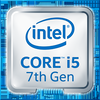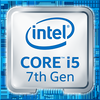Intel Atom E3805 vs Intel Core i5-7600K vs Intel Core i5-7500T
Intel Atom E3805
► remove from comparison
Der Intel Atom E3805 ist ein sparsamer low-end Dual-Core-SoC für eingebettete Systeme. Mögliche Einsatzgebiete sind unter anderem PKWs und Nutzfahrzeuge, Industrieanlagen, Netzwerkanwendungen oder militärische Systeme. Er taktet mit 1,33 GHz und gehört der Bay-Trail-Plattform an. Dank eines speziell für Low-Power-Chips optimierten 22-Nanometer-Prozesses (P1271) mit Tri-Gate-Transistoren konnte die Performance sowie die Energieeffizienz gegenüber früheren Atom-Prozessoren deutlich gesteigert werden.
Im Gegensatz zu den meisten anderen Modellen der E3800er-Serie integriert der E3805 keine Grafikeinheit und verfügt deshalb über eine besonders niedrigen Leistungsaufnahme.
Architektur
Die Prozessorkerne basieren auf der Silvermont-Architektur, welche erstmals bei einem Atom-Prozessor als out-of-order-Design ausgeführt wurde. Die dadurch erhöhte Auslastung der Pipeline sowie viele weitere Detailverbesserungen (optimierte Sprungvorhersage, vergrößerte Buffer, verbesserte Decoder) steigern die Pro-MHz-Leistung um etwa 50 Prozent. Gleichzeitig entfällt allerdings das Hyper-Threading-Feature der Vorgängermodelle. Weitere wichtige Änderungen umfassen die Unterstützung neuer Befehlssatzerweiterungen wie SSE 4.1 und 4.2 sowie AES-NI (modellabhängig).
Performance
Dank der verbesserten Mikroarchitektur übertrifft die Performance trotz der niedrigen Taktrate viele ältere Atom-Modelle und ist in etwa mit AMDs C-50 APU vergleichbar. Für einfache Anwendungen und Steuerungs-Aufgaben bestehen ausreichende Leistungsreserven, nicht jedoch für anspruchsvollere Software.
Leistungsaufnahme
Der gesamte SoC wird von Intel mit einer TDP von 3 Watt spezifiziert, sodass der Chip auch in sehr kompakten Geräten eingesetzt werden kann und keiner aktiven Kühlung bedarf.
Intel Core i5-7600K
► remove from comparison
Der Intel Core i5-7600K ist ein High-End Quad-Core Desktop-Prozessor auf Basis der Kaby-Lake-Architektur, der im August 2015 vorgestellt wurde. Die in einem verbesserten 14-Nanometer-Prozess gefertigte CPU taktet mit 3,8 bis 4,2 GHz, bietet jedoch kein Hyper-Threading (daher nur 4 Threads). Als sogenanntes "K"-Modell verfügt der Core i7-7700K über einen freien Multiplikator und lässt sich so besonders einfach übertakten.
Performance
Durch die relativ hohe Taktrate positioniert sich der i5-7600K etwa 10% vor dem direkten Vorgänger, dem Core i5-6600K und etwas hinter dem älteren Spitzenmodell i7-4790K. Die Leistung pro Takt ist identisch zu den Skylake Modellen. Auch anspruchsvollste Programme und Spiele werden von der High-End-CPU problemlos bewältigt.
Mehr Benchmarks finden Sie auch in unserem Vergleich der AMD Ryzen 7 CPUs gegen Intel CPUs.
Grafikeinheit
Für Grafikberechnungen zeigt sich die im Prozessor integrierte Intel HD Graphics 630 mit 24 EUs (Execution Units) verantwortlich, die mit 350 - 1150 MHz taktet. Die Leistung ist vergleichbar mit der alten Intel HD Graphics 530 und siedelt sich daher im absoluten Low-End-Bereich an, sodass aktuelle Spiele allenfalls in niedrigen Einstellungen flüssig dargestellt werden.
Leistungsaufnahme
Der TDP ist wie beim Spitzenmodell i7-7700K mit 91 Watt festgelegt.
Intel Core i5-7500T
► remove from comparison
Der Intel Core i5-7600K ist ein sparsamer Desktop Quad-Core Prozessor auf Basis der Kaby-Lake-Architektur, der im Anfang 2017 vorgestellt wurde. Die in einem verbesserten 14-Nanometer-Prozess gefertigte CPU taktet mit 2,7 bis 3,3 GHz, bietet jedoch kein Hyper-Threading (daher nur 4 Threads).
Für Grafikberechnungen zeigt sich die im Prozessor integrierte Intel HD Graphics 630 mit 24 EUs (Execution Units) verantwortlich, die mit 350 - 1100 MHz taktet.
Der TDP ist sogar geringer als bei den Mobilprozessoren (45 Watt der HQ Serie) auf nur 35 Watt spezifiziert, wodurch die Desktop CPU auch in Laptops zur Anwendung kommt.
| Model | Intel Atom E3805 | Intel Core i5-7600K | Intel Core i5-7500T | ||||||||||||||||||||||||||||||||||||||||||||||||||||||||||||||||||||||||||||||||||||||||||||||||||||||||||||||||||||||||||||||||||||||||||||||||||||||||||||||||||||||||||||||||||||||||||||||||||||||||||||||||||||||||||||||||||||||||||||||||||||||||||||||||||||||||||||||||||||||||||||||||||||||||||||||||||||||||||||||||||||||||||||||||||||||||||||||||||||||||
| Codename | Bay Trail | Kaby Lake | Kaby Lake | ||||||||||||||||||||||||||||||||||||||||||||||||||||||||||||||||||||||||||||||||||||||||||||||||||||||||||||||||||||||||||||||||||||||||||||||||||||||||||||||||||||||||||||||||||||||||||||||||||||||||||||||||||||||||||||||||||||||||||||||||||||||||||||||||||||||||||||||||||||||||||||||||||||||||||||||||||||||||||||||||||||||||||||||||||||||||||||||||||||||||
| Series | Intel Atom | Intel Kaby Lake | Intel Kaby Lake | ||||||||||||||||||||||||||||||||||||||||||||||||||||||||||||||||||||||||||||||||||||||||||||||||||||||||||||||||||||||||||||||||||||||||||||||||||||||||||||||||||||||||||||||||||||||||||||||||||||||||||||||||||||||||||||||||||||||||||||||||||||||||||||||||||||||||||||||||||||||||||||||||||||||||||||||||||||||||||||||||||||||||||||||||||||||||||||||||||||||||
| Serie: Kaby Lake Kaby Lake |
|
|
| ||||||||||||||||||||||||||||||||||||||||||||||||||||||||||||||||||||||||||||||||||||||||||||||||||||||||||||||||||||||||||||||||||||||||||||||||||||||||||||||||||||||||||||||||||||||||||||||||||||||||||||||||||||||||||||||||||||||||||||||||||||||||||||||||||||||||||||||||||||||||||||||||||||||||||||||||||||||||||||||||||||||||||||||||||||||||||||||||||||||||
| Clock | 1330 MHz | 3800 - 4200 MHz | 2700 - 3300 MHz | ||||||||||||||||||||||||||||||||||||||||||||||||||||||||||||||||||||||||||||||||||||||||||||||||||||||||||||||||||||||||||||||||||||||||||||||||||||||||||||||||||||||||||||||||||||||||||||||||||||||||||||||||||||||||||||||||||||||||||||||||||||||||||||||||||||||||||||||||||||||||||||||||||||||||||||||||||||||||||||||||||||||||||||||||||||||||||||||||||||||||
| L1 Cache | 112 KB | 256 KB | 256 KB | ||||||||||||||||||||||||||||||||||||||||||||||||||||||||||||||||||||||||||||||||||||||||||||||||||||||||||||||||||||||||||||||||||||||||||||||||||||||||||||||||||||||||||||||||||||||||||||||||||||||||||||||||||||||||||||||||||||||||||||||||||||||||||||||||||||||||||||||||||||||||||||||||||||||||||||||||||||||||||||||||||||||||||||||||||||||||||||||||||||||||
| L2 Cache | 1 MB | 1 MB | 1 MB | ||||||||||||||||||||||||||||||||||||||||||||||||||||||||||||||||||||||||||||||||||||||||||||||||||||||||||||||||||||||||||||||||||||||||||||||||||||||||||||||||||||||||||||||||||||||||||||||||||||||||||||||||||||||||||||||||||||||||||||||||||||||||||||||||||||||||||||||||||||||||||||||||||||||||||||||||||||||||||||||||||||||||||||||||||||||||||||||||||||||||
| Cores / Threads | 2 / 2 | 4 / 4 | 4 / 4 | ||||||||||||||||||||||||||||||||||||||||||||||||||||||||||||||||||||||||||||||||||||||||||||||||||||||||||||||||||||||||||||||||||||||||||||||||||||||||||||||||||||||||||||||||||||||||||||||||||||||||||||||||||||||||||||||||||||||||||||||||||||||||||||||||||||||||||||||||||||||||||||||||||||||||||||||||||||||||||||||||||||||||||||||||||||||||||||||||||||||||
| TDP | 3 Watt | 91 Watt | 35 Watt | ||||||||||||||||||||||||||||||||||||||||||||||||||||||||||||||||||||||||||||||||||||||||||||||||||||||||||||||||||||||||||||||||||||||||||||||||||||||||||||||||||||||||||||||||||||||||||||||||||||||||||||||||||||||||||||||||||||||||||||||||||||||||||||||||||||||||||||||||||||||||||||||||||||||||||||||||||||||||||||||||||||||||||||||||||||||||||||||||||||||||
| Technology | 22 nm | 14 nm | 14 nm | ||||||||||||||||||||||||||||||||||||||||||||||||||||||||||||||||||||||||||||||||||||||||||||||||||||||||||||||||||||||||||||||||||||||||||||||||||||||||||||||||||||||||||||||||||||||||||||||||||||||||||||||||||||||||||||||||||||||||||||||||||||||||||||||||||||||||||||||||||||||||||||||||||||||||||||||||||||||||||||||||||||||||||||||||||||||||||||||||||||||||
| max. Temp. | -40 °C - 110 °C | ||||||||||||||||||||||||||||||||||||||||||||||||||||||||||||||||||||||||||||||||||||||||||||||||||||||||||||||||||||||||||||||||||||||||||||||||||||||||||||||||||||||||||||||||||||||||||||||||||||||||||||||||||||||||||||||||||||||||||||||||||||||||||||||||||||||||||||||||||||||||||||||||||||||||||||||||||||||||||||||||||||||||||||||||||||||||||||||||||||||||||
| Socket | FCBGA1170 | FCLGA1151 | FCLGA1151 | ||||||||||||||||||||||||||||||||||||||||||||||||||||||||||||||||||||||||||||||||||||||||||||||||||||||||||||||||||||||||||||||||||||||||||||||||||||||||||||||||||||||||||||||||||||||||||||||||||||||||||||||||||||||||||||||||||||||||||||||||||||||||||||||||||||||||||||||||||||||||||||||||||||||||||||||||||||||||||||||||||||||||||||||||||||||||||||||||||||||||
| Features | Single-Channel DDR3L-1067 (max. 8 GB, optional ECC), AES-NI, 4x PCIe 2.0 | DDR3(L)-1600/DDR4-2400 Memory Controller, AVX, AVX2, AES-NI, TSX-NI, Quick Sync, Virtualization, vPro | DDR3(L)-1600/DDR4-2400 Memory Controller, AVX, AVX2, AES-NI, TSX-NI, Quick Sync, Virtualization, vPro | ||||||||||||||||||||||||||||||||||||||||||||||||||||||||||||||||||||||||||||||||||||||||||||||||||||||||||||||||||||||||||||||||||||||||||||||||||||||||||||||||||||||||||||||||||||||||||||||||||||||||||||||||||||||||||||||||||||||||||||||||||||||||||||||||||||||||||||||||||||||||||||||||||||||||||||||||||||||||||||||||||||||||||||||||||||||||||||||||||||||||
| Architecture | x86 | x86 | x86 | ||||||||||||||||||||||||||||||||||||||||||||||||||||||||||||||||||||||||||||||||||||||||||||||||||||||||||||||||||||||||||||||||||||||||||||||||||||||||||||||||||||||||||||||||||||||||||||||||||||||||||||||||||||||||||||||||||||||||||||||||||||||||||||||||||||||||||||||||||||||||||||||||||||||||||||||||||||||||||||||||||||||||||||||||||||||||||||||||||||||||
| $31 U.S. | $242 U.S. | $202 U.S. | |||||||||||||||||||||||||||||||||||||||||||||||||||||||||||||||||||||||||||||||||||||||||||||||||||||||||||||||||||||||||||||||||||||||||||||||||||||||||||||||||||||||||||||||||||||||||||||||||||||||||||||||||||||||||||||||||||||||||||||||||||||||||||||||||||||||||||||||||||||||||||||||||||||||||||||||||||||||||||||||||||||||||||||||||||||||||||||||||||||||||
| Announced | |||||||||||||||||||||||||||||||||||||||||||||||||||||||||||||||||||||||||||||||||||||||||||||||||||||||||||||||||||||||||||||||||||||||||||||||||||||||||||||||||||||||||||||||||||||||||||||||||||||||||||||||||||||||||||||||||||||||||||||||||||||||||||||||||||||||||||||||||||||||||||||||||||||||||||||||||||||||||||||||||||||||||||||||||||||||||||||||||||||||||||
| Manufacturer | ark.intel.com | ark.intel.com | ark.intel.com | ||||||||||||||||||||||||||||||||||||||||||||||||||||||||||||||||||||||||||||||||||||||||||||||||||||||||||||||||||||||||||||||||||||||||||||||||||||||||||||||||||||||||||||||||||||||||||||||||||||||||||||||||||||||||||||||||||||||||||||||||||||||||||||||||||||||||||||||||||||||||||||||||||||||||||||||||||||||||||||||||||||||||||||||||||||||||||||||||||||||||
| L3 Cache | 8 MB | 6 MB | |||||||||||||||||||||||||||||||||||||||||||||||||||||||||||||||||||||||||||||||||||||||||||||||||||||||||||||||||||||||||||||||||||||||||||||||||||||||||||||||||||||||||||||||||||||||||||||||||||||||||||||||||||||||||||||||||||||||||||||||||||||||||||||||||||||||||||||||||||||||||||||||||||||||||||||||||||||||||||||||||||||||||||||||||||||||||||||||||||||||||
| iGPU | Intel HD Graphics 630 (350 - 1150 MHz) | Intel HD Graphics 630 (350 - 1100 MHz) |
Benchmarks
Average Benchmarks Intel Core i5-7600K → 0% n=0
Average Benchmarks Intel Core i5-7500T → 0% n=0
* Smaller numbers mean a higher performance
1 This benchmark is not used for the average calculation













